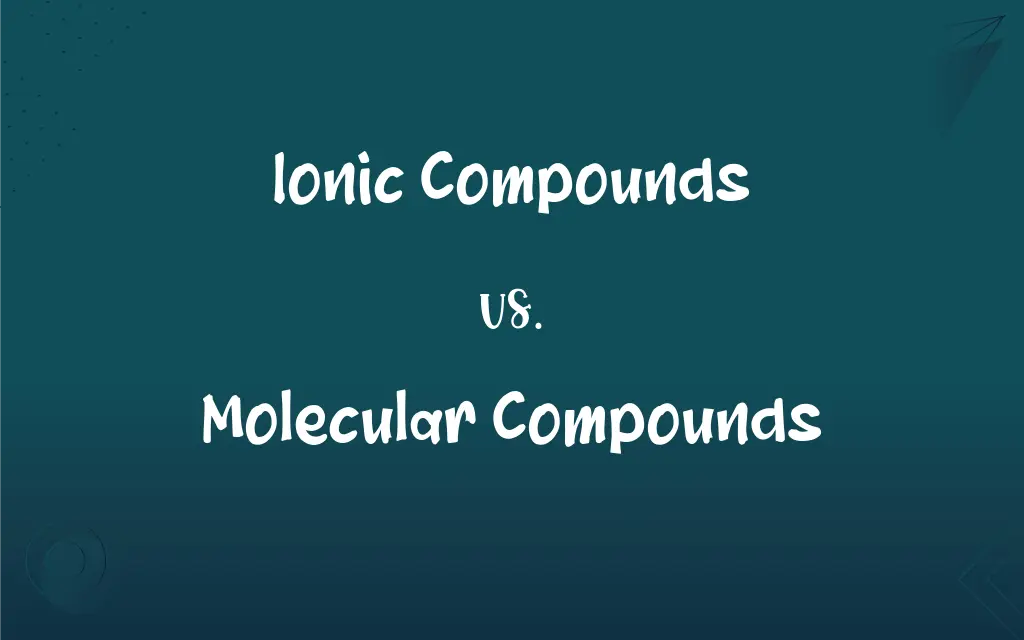Ionic Compounds vs. Molecular Compounds: What's the Difference?
Edited by Aimie Carlson || By Harlon Moss || Updated on October 4, 2023
Ionic compounds form from ions via electrostatic attraction; molecular compounds form from covalently bonded atoms.

Key Differences
Ionic compounds are formed when positively charged cations and negatively charged anions come together through electrostatic attraction. These compounds typically form between metals and nonmetals. Molecular compounds, on the other hand, are made of atoms that share electrons through covalent bonds, generally between two nonmetals.
In ionic compounds, the high difference in electronegativity between the combining atoms leads to the transfer of electrons, forming ions. These compounds often have high melting and boiling points. Molecular compounds are formed when atoms share electrons to complete their octet, leading to generally lower melting and boiling points.
Ionic compounds in solid form typically conduct electricity when melted or dissolved in water because their ions are free to move. Molecular compounds, in contrast, usually don't conduct electricity in any state since they don't have free-moving ions.
Ionic compounds often form crystalline structures called lattices. Their strong ionic bonds result in certain geometric patterns. Molecular compounds usually lack such regular patterns due to the nature of their covalent bonds.
In terms of solubility, ionic compounds usually dissolve well in polar solvents like water, as water molecules can surround and separate the ions. Molecular compounds, depending on their polarity, may or may not dissolve well in water.
ADVERTISEMENT
Comparison Chart
Type of Bond
Electrostatic attraction between ions
Covalent bonds between atoms
Conductivity
Conduct when melted or dissolved
Generally don't conduct
Formation
Between metals and nonmetals
Typically between nonmetals
Melting/Boiling Points
High
Lower than ionic
Structure
Crystalline lattice
Lacks regular patterns
ADVERTISEMENT
Ionic Compounds and Molecular Compounds Definitions
Ionic Compounds
Typically soluble in polar solvents like water.
Lithium chloride (LiCl) dissolves well in water due to its ionic nature.
Molecular Compounds
Chemical entities with generally lower melting and boiling points than ionic compounds.
Methane (CH₄) is a molecular compound.
Ionic Compounds
Chemical entities with high melting and boiling points due to strong ionic bonds.
Calcium fluoride (CaF₂) is an ionic compound.
Molecular Compounds
They lack the crystalline lattice structure found in ionic compounds.
Ammonia (NH₃) is a molecular compound.
Ionic Compounds
Compounds formed from the electrostatic attraction between cations and anions.
Sodium chloride (NaCl) is an ionic compound.
Molecular Compounds
Compounds formed by sharing electrons through covalent bonds.
Water (H₂O) is a molecular compound.
Ionic Compounds
They form crystalline structures when in solid state.
Potassium bromide (KBr) is an ionic compound.
Molecular Compounds
Substances composed of atoms from nonmetals.
Carbon dioxide (CO₂) is a molecular compound.
Ionic Compounds
Substances resulting from the transfer of electrons from one atom to another.
Magnesium oxide (MgO) is an ionic compound.
Molecular Compounds
Their solubility in water varies depending on their polarity.
Methanol (CH₃OH) is a molecular compound soluble in water.
FAQs
How do molecular compounds form?
Molecular compounds form from covalently bonded atoms.
Do molecular compounds conduct electricity?
Generally, molecular compounds don't conduct electricity.
Can ionic compounds conduct electricity?
Yes, ionic compounds can conduct when melted or dissolved.
Which has higher melting points, ionic or molecular compounds?
Ionic compounds generally have higher melting points.
Between which elements do ionic compounds usually form?
Ionic compounds usually form between metals and nonmetals.
Which elements typically form molecular compounds?
Molecular compounds are typically formed between nonmetals.
How are the structures of ionic compounds usually described?
Ionic compounds form crystalline lattices.
Are ionic compounds typically soluble in water?
Yes, many ionic compounds are soluble in water.
How do molecular compounds typically appear structurally?
Molecular compounds lack regular patterns.
Do all molecular compounds dissolve in water?
No, the solubility of molecular compounds varies.
Can you give an example of an ionic compound?
Sodium chloride (NaCl) is an example of an ionic compound.
Can you give an example of a molecular compound?
Methane (CH₄) is an example of a molecular compound.
Why do ionic compounds have high boiling points?
Due to strong ionic bonds and the resulting lattice structure.
Are all molecular compounds gases?
No, molecular compounds can be gases, liquids, or solids.
Which type of compound is water?
Water is a molecular compound.
What forms the basis of ionic compounds?
Ionic compounds are based on electrostatic attraction between cations and anions.
Which compound involves the transfer of electrons?
Ionic compounds involve the transfer of electrons.
What is the primary bond in molecular compounds?
Covalent bonds are primary in molecular compounds.
How do you differentiate between ionic and molecular compounds based on conductivity?
Ionic compounds conduct when melted or dissolved, molecular compounds generally don't.
Are molecular compounds always between two different elements?
No, they can also be between the same elements, like O₂.
About Author
Written by
Harlon MossHarlon is a seasoned quality moderator and accomplished content writer for Difference Wiki. An alumnus of the prestigious University of California, he earned his degree in Computer Science. Leveraging his academic background, Harlon brings a meticulous and informed perspective to his work, ensuring content accuracy and excellence.
Edited by
Aimie CarlsonAimie Carlson, holding a master's degree in English literature, is a fervent English language enthusiast. She lends her writing talents to Difference Wiki, a prominent website that specializes in comparisons, offering readers insightful analyses that both captivate and inform.






























































